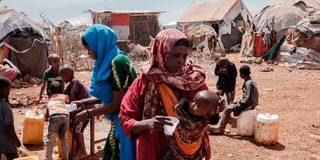Happening Now: Donald Trump's second inauguration
Severe drought displaces 918,000 people in Somalia: UN

Bulley Hassanow Alliyow (right),30, gives water to her child at Tawkal 2 Dinsoor camp for internally displaced persons (IDPs) in Baidoa, Somalia.
Severe drought in Somalia, with malnutrition and disease outbreaks surging, has displaced 918,000 people from their homes, UN humanitarians have said.
Currently, more than 90 percent of Somalia experiences severe to extreme drought conditions.
The forecast of a historic fifth poor rainy season will keep needs high well into 2023, the UN Office for the Coordination of Humanitarian Affairs (OCHA) said.
Humanitarians reached more than 4 million people with life-saving assistance since January, out of the 7 million affected.
They gave priority to the most vulnerable people in areas of highest need as catastrophic hunger looms, the office said in its latest situation report released on Wednesday.
The UN Humanitarian Air Service reached about 900,000 vulnerable people in hard-to-reach areas, it said.
"Malnutrition and disease outbreaks have surged, and more people are facing difficulties accessing safe water, proper sanitation, and adequate food," said OCHA.
It said donations had significantly boosted the funding needed to scale up the humanitarian response.
As a result, partners will expand humanitarian assistance to reach more drought-affected people, including marginalised groups in areas of greatest need.
Meanwhile the United Nations has renewed its warnings over possible food shortage in Sudan amid continued lack of international funding.
"The humanitarian situation in Sudan continued to be a major concern, with a steady increase in food insecurity levels, more civilian displacement and the arrival of more refugees from neighbouring countries, mainly South Sudan, Ethiopia and Eritrea," OCHA) said in the report.
"Almost a quarter of the country's population (11.7 million people) are estimated to be facing acute hunger from June to September, an increase by nearly 2 million people compared with the same period last year," OCHA said, citing latest analysis by the Integrated Food Security Phase Classification (IPC) on food security in Sudan.
This came as the World Food Programme (WFP) in Sudan announced that it had been forced to cut rations for refugees across the country since June because of severe funding shortfalls.
The WFP regularly assists over 550,000 refugees in Sudan, including among those forcibly displaced, the report said, adding these cuts could exacerbate protection risks as refugees may resort to negative coping mechanisms, including school drop-out, child labour, early marriage, and sexual and gender-based violence.
The UN Food and Agriculture Organisation (FAO) attributed the increase in the number of people facing hunger to Sudan's fragile economy, prolonged dry spells, reduced cultivated area, and erratic rainfall, said the report.
FAO has launched a new project which aims to restore the food security and nutrition of resource-poor farming and pastoral communities through the provision of emergency agriculture and livestock supplies, the report said.
Sudan has been witnessing continued rise in prices of bread made of wheat flour, with one loaf now reaching 50 Sudanese pounds (0.11 U.S. dollars).
The gap between wheat production and consumption in Sudan ranges between 60 to 70 percent.
The annual consumption is about 2.4 million tons, while the local production stands at about 700,000 tons, according to official statistics.
Sudan has been plagued by an economic crisis since the secession of South Sudan in 2011, which cost Sudan 75 percent of its oil revenues.
The crisis was exacerbated when the US and international agencies suspended aid after Abdel Fattah Al-Burhan, general commander of the Sudanese armed forces, declared a state of emergency on October 25, 2021 and dissolved the Sovereign Council.
The US suspended 700 million dollars in economic aid to Sudan, while the World Bank failed to offer Sudan the 500 million dollars due in November 2021. T
he International Monetary Fund (IMF) also halted 150 million dollars in special drawing rights for Sudan.
Sudan's debt relief process under the Heavily Indebted Poor Countries Initiative of the IMF has also been suspended.



